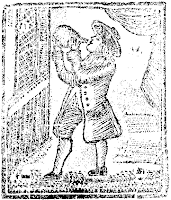Cannonballs and a Deserter Come into Boston
 Here’s another snatch of selectman Timothy Newell’s diary of the siege of Boston. These entries came a week after the Battle of Bunker Hill, as rumors flew that the British army would try to push back the provincial forces on the other side of the town as well.
Here’s another snatch of selectman Timothy Newell’s diary of the siege of Boston. These entries came a week after the Battle of Bunker Hill, as rumors flew that the British army would try to push back the provincial forces on the other side of the town as well.
24th [June]. About 12 oClock at noon began a Cannonade of Roxbury and set fire to one or two houses which was extinguished. Two Men killed at Brown’s house from a small party of Regulars. Great expectations from this day’s operations, as last night four Transports, Gondaloes &c. full of Troops, as was said, intended to land at Dorchester neck to attack the Provincials, but an alarm gun was said to be fired and fires kindled to alarm the Country—the great force said to be collected prevented this expedition. This account was given by one Morrison who deserted and came in this day from the Provincials. It is said he was in the Redoubt at Bunker Hill.“Brown’s house” was on Boston Neck, the narrow strip of dry land that then connected Boston to the rest of Massachusetts. “Dorchester Neck” was a peninsula off Dorchester. All that topography has changed greatly since 1775 because of landfills. As for Morrison, he was John Morrison of Peterborough, New Hampshire. The New Hampshire Churches (1856) says he was born in Pathfoot, Scotland, in 1739. Leonard Allison Morrison’s The History of the Morison or Morrison Family (1880) says he had graduated from the University of Edinburgh in 1765. The next year, Morrison came to Peterborough, which was largely settled by people of Scottish origin or ancestry, several of them also named Morrison or Morison. In November 1766 he became the first official Presbyterian minister there. But the Rev. Mr. Morrison served only until March 1772, when the congregation dismissed him for cause. Now that’s the kind of gossip Boston 1775 enjoys! Unfortunately, the sources I can find aren’t very juicy. That Morrison family history says, “His abilities were good, but by disreputable practices he lost the respect of the people.” Too vague. George Abbot Morison’s 1876 History of Peterborough calls Morrison an “object of intemperance.” That’s more like it. But I believe that Albert Smith’s competing History of the Town of Peterborough would have more to say about “scandalous behavior.” Smith’s history, in the short extract downloadable from here, says Morrison was with the Peterborough militia company on the day of Bunker Hill, but “remained in camp, and excused himself from accompanying his friends, alleging that the lock of his gun was so injured as to be useless. Shortly after he passed over to Boston and joined the British.” So Morrison wasn’t in the redoubt on Breed’s Hill, and his remarks about the alarm in Dorchester might be suspect as well. By late 1776 he was a commissary with the British army, a position he held until his death in 1782. Newell would cross paths with Morrison in Boston months later. In the meantime, he had artillery fire to worry about.
26th [June] PM. Many cannon fired on both sides from the lines &c. 27th. Tolerable quiet; only a few cannon exchanged from the lines. 30th. Cannonade from Roxbury and the lines.Newell’s diary shows how the New England troops had cannons well before Col. Henry Knox brought guns from Fort Ticonderoga, and they weren’t shy about using them. ADDENDUM: This article by George B. Kirsch in Church History says that the John Morrison scandal also involved sex. But I can’t get to the good bits through Google. ADDENDUM #2: I have always relied on the kindness of Boston 1775 readers.

No comments:
Post a Comment